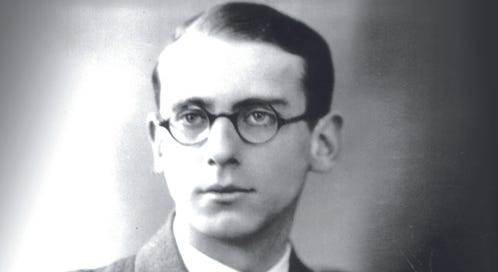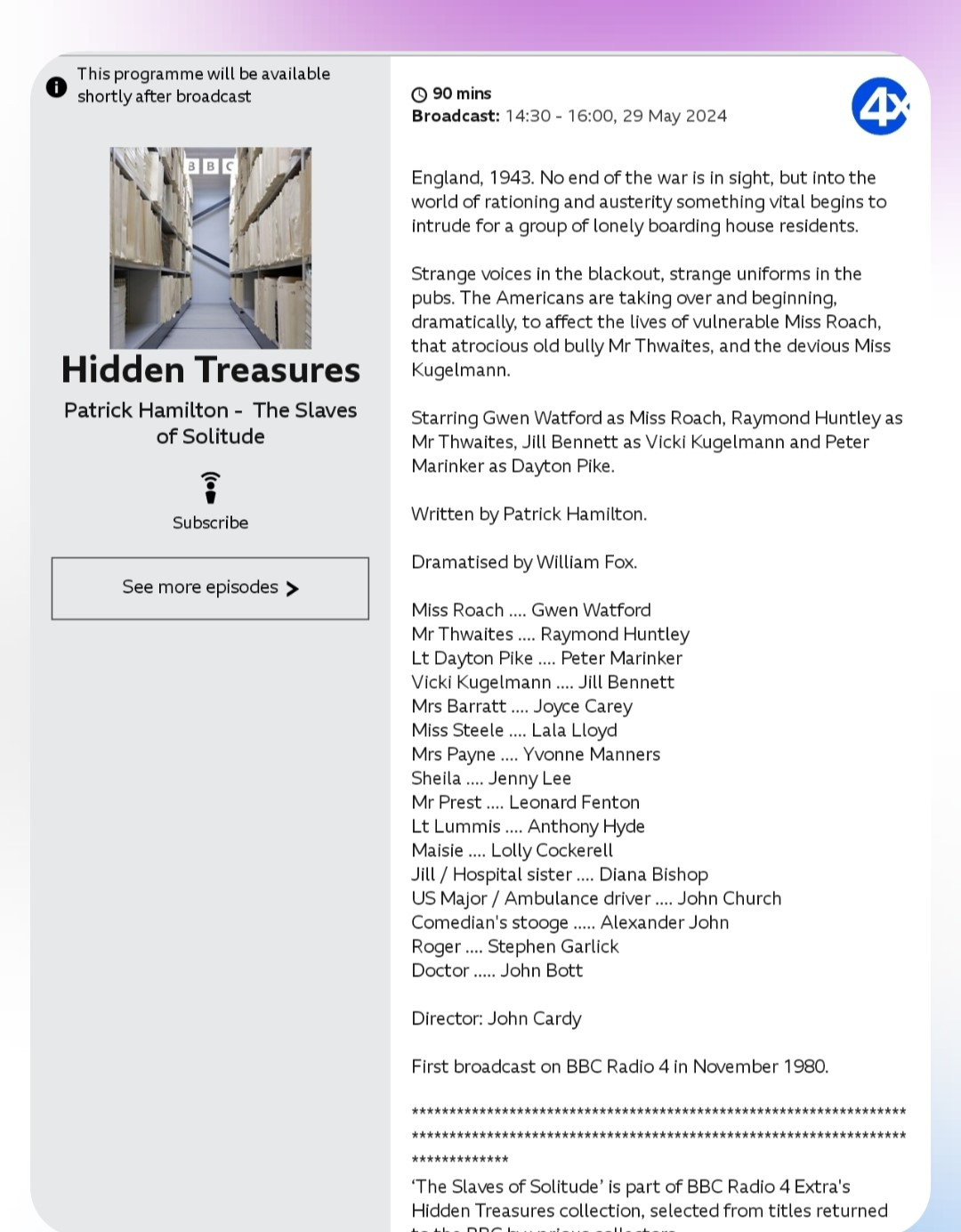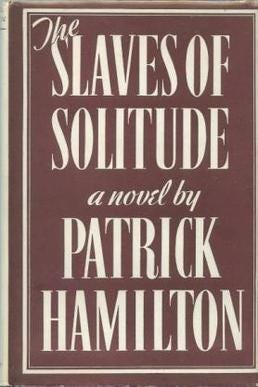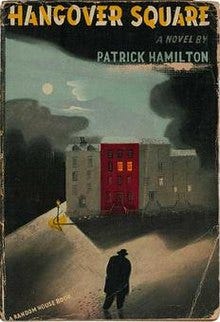Like most people (I imagine) I have a revolving list of books that I consider to be my ‘favourite’ - the Desert Island Discs book: Good Morning, Midnight… A Wreath of Roses… The Rainbow… The Pursuit of Love… Le Rouge et le Noir… The Driver’s Seat… And on that list, often spinning to the top of it, is the 1947 novel The Slaves of Solitude, which I love the most of all Patrick Hamilton’s books, which for me is saying something.
Hamilton is the man who gave us the word ‘gaslighting’, from his 1938 play Gas Light, set in the high Victorian era, in which a monstrous husband seeks to convince his wife that she is going mad; his party piece being to dim the lights in the house then tell her that they are not dimmed.
The word has become an overused-to-the-point-of-meaningless bore (if my new moisturizer does not render my skin perfect then it is gaslighting me) but Hamilton is anything but. Although he made a sensation with his plays Gas Light and, earlier, with Rope, written in 1929 when he was just twenty-five, he is one of the great twentieth century novelists. To a degree that I think is unparalleled, his world is his own: both milieu and style. And I sometimes wonder whether anybody writes better about England.
Anyway: this long post started when a very lovely subscriber, a fellow Hamilton fan, sent me the below:
I’m so glad to have been alerted to it - a peculiar pleasure to hear something faithful to the original but not deadened by fidelity (in fact this whole Radio 4 Extra Hidden Treasures series looks great, I noticed for instance Dear Octopus by Dodie Smith which was recently on at the National…)
Marvellous acting! Jill Bennett: off the scale fabulous. Some of the cast was unknown to me but I recognized the voice of Gwen Watford, whom I saw most recently in one of Agatha’s under-rated little Parker Pyne stories, which occasionally appear on something like the Drama channel. A charming bagatelle of a piece, given depth by Gwen in the role of a neglected middle-aged wife: timid, dignified, respectable, yearning-to-bloom. The defining qualities, incidentally, of Miss Roach in The Slaves of Solitude.
Miss Roach - Enid - is a woman in her late thirties. She works for a London publisher and is living, for the duration of the war (the book is set in 1943), at a boarding-house called the Rosamund Tea Rooms in ‘Thames Lockdon’, a representation of Henley.
It is through her mild, intelligent eyes that we experience the novel. We see the beyond-petty world of the Rosamund Tea Rooms (that name), in which ludicrous personal antipathies become ever more entrenched and territorial, thus an ironized reflection of the conflict that is engaging the world. Miss Roach perceives the absurdity even as she too becomes a reluctant combatant upon the boarding-house battlefield.
I love her, very much indeed, although still more I love a character called Mr Prest (of whom more later). But what I most love about this novel - what I think of as its ‘theme’, forgive the sixth-former terminology - is its two opposing worlds: the Rosamund Tea Rooms and the local pub, the Rising Sun. Symbols, as it seems to me, of opposing aspects of England, what I would call its narrow versus its broad-minded aspect. Curtain-twitching and embittered complaints about the time-change to The Archers omnibus versus this one’s on me and Victoria Wood. The boarding-house versus the public house.
As I put it in my book The Last Landlady - a memoir of my publican grandmother, in which I write about Hamilton, and The Slaves of Solitude in particular:
Set against the pub is Hamilton’s other milieu: the boarding house. Like the pub it is a home that is not quite a home. At the same time it is the pub’s spiritual opposite. Its métier is not to forgive but to judge, everything from the timbre of a voice to the loudness of a check suit.
The subtitle of my book is ‘An English Memoir’, and I say England rather than Britain because that is what I know. More to the point it is what Patrick Hamilton knew. He is a supremely English novelist, with his understanding of facades, concealment, the necessary release offered by alcohol. And, of course, of class. His novel Mr Stimpson and Mr Gorse is a majestic evisceration of that lunatic concept: Joan Plumleigh-Bruce, first lady of Reading, is bamboozled by Ernest Ralph Gorse, career criminal, who gets hold of her life savings because of his Barenboim-level ability to play upon the superiority/inferiority complex within her social snobbery.
The Slaves of Solitude, while again all about class, is also about Patrick Hamilton’s two Englands, and because the broad and open England is so beautifully implied, because it thrives within Miss Roach’s civilized soul, the novel is deeply humane. Mr Stimpson is only humane in its own awareness of what it blatantly lacks. It shows almost every character in the worst possible light, and why not? Although this bothered Hamilton’s publisher no end - what an idiot, but he was right in that the creed of likeability (I didn’t like any of the characters, goes up the enraged wail on Goodreads) does persist. As does the notion that Hamilton is a writer who disdains empathy, a misanthrope, scrutinizing his subject matter in a way that today would probably be called forensic (a word whose misapplication has reached gaslit levels).
Well: Slaves abounds in compassion, although there are some truly appalling characters. Chief among them is Mr Thwaites, tyrant king of the Rosamund Tea Rooms, who drinks deep daily of the delight of tormenting the woman he calls Dame Roach. And who - worse yet - thinks that: ‘Public houses were not really things which were supposed to take place at all.’
As I wrote in The Last Landlady, Patrick Hamilton was the great poet of the pub (along with Kingsley Amis), and perhaps the greatest of all writers about drink. This is not just because he knew of what he wrote, although my goodness he did (he was dead from the stuff at fifty-eight). It is because of the way in which he wrote about it, using words as he does, like no other novelist, with a relentless control that is nonetheless not unlike a person in the wavering grip of alcohol. As I put it in my book: ‘his obsessional style captured every surge and retreat within the rhythms of an evening’s session, and the terrible dogged logic that takes possession of the swooning mind’.
Alongside this soul-deep familiarity with the pub - the Earl’s Court pub with a canary in its cage in Hangover Square, the Midnight Bell on the Euston Road in Twenty Thousand Streets Under the Sky, the baronial-themed Friar in Mr Stimpson - Hamilton was the poet of the boarding house. The ‘self-respecting’ types who inhabited such places - desperately keeping their ends up, while the people in pubs were more than happy to let them down – find pubs faintly shocking, like bookmakers, but are accordingly much compelled by them. Once Mr Thwaites in Slaves gets a few drinks down him at the Rising Sun, there is no holding him. In the early novel Craven House, also set in a boarding house, one of the residents regularly dodges the congealing Sunday roast on the pretext of needing a good long ‘tramp’; in other words a pub crawl, which clearly keeps him somewhere close to sane.
‘Nevertheless’ - as I wrote - ‘the anti-pub facade must be maintained.’
Yet because of the war, the loosening that it induces, the sweet Miss Roach is emboldened to shed the boarding house sensibility that is, in fact, no more than her protective class-based covering; and, in doing so, to move towards her own tentative salvation. ‘She had no longer any fear of entering public houses…’ She is invited to the Rising Sun by an American lieutenant whom she begins to think of as ‘hers’, while at the same time recognizing that he too is behaving with a war-induced carpe diem recklessness (in so far as is possible in Henley).
But - in my reading of the novel - the real shift for Miss Roach comes through Mr Prest, a man in late middle-age who lives at the Rosamund Tea Rooms although, like her, not a boarding house type. Unlike her, he makes no pretence at being one. Instead he wears loud suits, drinks every day in the local pubs and is ‘regarded as being somehow beyond the pale’.
My one criticism of the radio dramatization of The Slaves of Solitude is that there was not enough Mr Prest, who is for me the hero of the novel, and indeed its heart.
What follows beyond the paywall (free trial option of course available) is an edited extract from The Last Landlady: about this great novel, the great Patrick Hamilton, and his two Englands. Plus an opinionated take on Brighton Rock for good measure. If you read on, I do hope you enjoy.
Keep reading with a 7-day free trial
Subscribe to Laura Thompson’s Substack to keep reading this post and get 7 days of free access to the full post archives.








